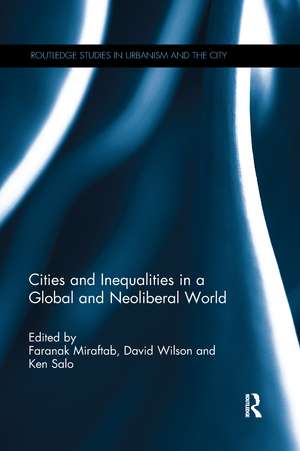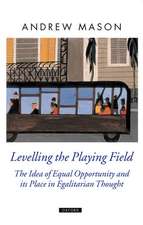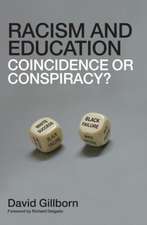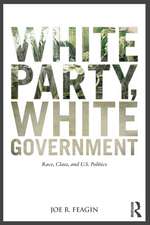Cities and Inequalities in a Global and Neoliberal World: Routledge Studies in Urbanism and the City
Editat de Faranak Miraftab, David Wilson, Ken Saloen Limba Engleză Paperback – 30 iun 2020
| Toate formatele și edițiile | Preț | Express |
|---|---|---|
| Paperback (1) | 387.38 lei 6-8 săpt. | |
| Taylor & Francis – 30 iun 2020 | 387.38 lei 6-8 săpt. | |
| Hardback (1) | 1220.63 lei 6-8 săpt. | |
| Taylor & Francis – 20 apr 2015 | 1220.63 lei 6-8 săpt. |
Din seria Routledge Studies in Urbanism and the City
-
 Preț: 355.06 lei
Preț: 355.06 lei -
 Preț: 325.21 lei
Preț: 325.21 lei -
 Preț: 309.50 lei
Preț: 309.50 lei -
 Preț: 319.41 lei
Preț: 319.41 lei -
 Preț: 280.29 lei
Preț: 280.29 lei - 14%
 Preț: 299.52 lei
Preț: 299.52 lei - 17%
 Preț: 272.50 lei
Preț: 272.50 lei - 18%
 Preț: 1005.04 lei
Preț: 1005.04 lei -
 Preț: 416.22 lei
Preț: 416.22 lei - 19%
 Preț: 258.50 lei
Preț: 258.50 lei - 18%
 Preț: 274.46 lei
Preț: 274.46 lei -
 Preț: 408.03 lei
Preț: 408.03 lei - 17%
 Preț: 271.82 lei
Preț: 271.82 lei - 12%
 Preț: 299.52 lei
Preț: 299.52 lei -
 Preț: 389.38 lei
Preț: 389.38 lei - 18%
 Preț: 1007.82 lei
Preț: 1007.82 lei -
 Preț: 390.57 lei
Preț: 390.57 lei -
 Preț: 386.35 lei
Preț: 386.35 lei -
 Preț: 386.22 lei
Preț: 386.22 lei - 18%
 Preț: 1001.21 lei
Preț: 1001.21 lei - 28%
 Preț: 709.38 lei
Preț: 709.38 lei -
 Preț: 469.34 lei
Preț: 469.34 lei - 18%
 Preț: 997.03 lei
Preț: 997.03 lei - 18%
 Preț: 1015.13 lei
Preț: 1015.13 lei - 14%
 Preț: 325.34 lei
Preț: 325.34 lei - 18%
 Preț: 1000.27 lei
Preț: 1000.27 lei - 14%
 Preț: 299.45 lei
Preț: 299.45 lei - 19%
 Preț: 268.78 lei
Preț: 268.78 lei -
 Preț: 381.21 lei
Preț: 381.21 lei - 25%
 Preț: 774.04 lei
Preț: 774.04 lei - 19%
 Preț: 270.20 lei
Preț: 270.20 lei - 17%
 Preț: 271.82 lei
Preț: 271.82 lei - 18%
 Preț: 1000.27 lei
Preț: 1000.27 lei - 18%
 Preț: 997.90 lei
Preț: 997.90 lei - 31%
 Preț: 764.20 lei
Preț: 764.20 lei
Preț: 387.38 lei
Nou
Puncte Express: 581
Preț estimativ în valută:
74.12€ • 77.60$ • 61.33£
74.12€ • 77.60$ • 61.33£
Carte tipărită la comandă
Livrare economică 05-19 aprilie
Preluare comenzi: 021 569.72.76
Specificații
ISBN-13: 9780367599324
ISBN-10: 0367599325
Pagini: 250
Dimensiuni: 156 x 234 x 15 mm
Greutate: 0.4 kg
Ediția:1
Editura: Taylor & Francis
Colecția Routledge
Seria Routledge Studies in Urbanism and the City
Locul publicării:Oxford, United Kingdom
ISBN-10: 0367599325
Pagini: 250
Dimensiuni: 156 x 234 x 15 mm
Greutate: 0.4 kg
Ediția:1
Editura: Taylor & Francis
Colecția Routledge
Seria Routledge Studies in Urbanism and the City
Locul publicării:Oxford, United Kingdom
Public țintă
PostgraduateCuprins
Part I. Urban Inequalities Across the World 1. Social Sustainability and Urban Inequality: Detroit and the Ravages of Neoliberalism 2. New Inequalities in America’s Rust Belt 3. From "Free-Market" Slums to Public Housing and Back Again: The Politics of Relocating Atlanta’s Poor 4. Socio-Spatial Inequality and Violence in Cities of the Global South: Evidence from Latin America 5. "City-Doubles:" Re-Urbanism in Africa 6. New Forms of Housing and Urban Inequalities in Postsocialist Eastern Europe 7. Small Cities, Big Issues: Indian Cities in the Debates on Urban Poverty and Inequality 8. The Paradox of Weiquan Movements: Social Inequality and Individual Negotiation in Land Development in Urban China Part II. Resistances and Insurgencies: Thoughts and Possibilities 9. Urban Insurgencies and the Re-Politicization of the Unequal City 10. Equality at the Beginning: Rancière and Democracy Today 11. Arts of Resistance: Seeing and Shaping the Struggle 12. Local Practices and Trans-local Solidarities: Reflections on Anti-Eviction Practices on the Cape Flats, South Africa, and in Southside Chicago, Illinois
Notă biografică
Faranak Miraftab is professor of Urban and Regional Planning at the University of Illinois at Urbana-Champaign. Her work seeks to understand the global and local development processes and contingencies involved in the formation of the city and citizens’ struggle to access urban space and socio economic resources. Her inter-disciplinary work explores three interconnected themes: a) neoliberal governance and the ways in which the state-society relations are managed and governed; b) grassroots mobilizations and the ways in which they claim right to urban livelihood and resources; and c) transnational and trans-local practices that shape globalization from below. She has taught and researched in several countries including Chile, Mexico, Canada, Australia, South Africa, and the United States. Her most recent research project concerns transnational networks of care and work that make for the development of the heartland US. With Victoria Beard and Chris Silver she is co-editor of Planning and Decentralization: Contested Spaces for Public Action in the Global South (2008) New York: Routledge. With Neema Kudva she is co-editor of Cities of the Global South Reader (2013) New York: Routledge.
Ken Salo is lecturer and the community development coordinator at the Department of Urban and Regional Planning at the University of Illinois at Urbana-Champaign. He teaches and conducts research in the areas of environmental justice, environmental racism, law and international environmental policy, global justice movements, international human rights, food security, legal cultures in postcolonial societies and international development and planning. More specifically he is closely connected with the social movements and grassroots groups that mobilize against urban injustices in the US and in South Africa. These include Anti-Eviction campaign in Chicago and in Western Cape as well as justice media project, among others. He is author of “Contested Legalities in the Production of Post-apartheid South Africa’s Privatizing Seafood Fishery.” African Studies Quarterly, Vol 9, no 4 Fall 2007.
David Wilson is professor of geography at the University of Illinois at Urbana-Champaign. He is currently investigating projects pivoting around the political economy of the U.S. city. Specific projects examine the politics of urban growth regimes in Midwest cities, the politics of competing discursive formations that generate gentrified neighborhoods and poverty communities, and the racializing of the contemporary urban issues of crime and city growth. He is author of Cities and Race: the New American Black Ghetto (2007) London: Routledge Inventing Black-On-Black Violence: Discourse, Space Representation (2005) Syracuse: Syracuse University. At the moment, he serves on the editorial boards of Urban Geography, Professional Geographer, Social and Cultural Geography, Syracuse University Press (Society, Space, and Place Book Series), Inter-Cultural Studies, the International Encyclopedia of Human Geography project and Acme: International Journal for Critical Geography.
Ken Salo is lecturer and the community development coordinator at the Department of Urban and Regional Planning at the University of Illinois at Urbana-Champaign. He teaches and conducts research in the areas of environmental justice, environmental racism, law and international environmental policy, global justice movements, international human rights, food security, legal cultures in postcolonial societies and international development and planning. More specifically he is closely connected with the social movements and grassroots groups that mobilize against urban injustices in the US and in South Africa. These include Anti-Eviction campaign in Chicago and in Western Cape as well as justice media project, among others. He is author of “Contested Legalities in the Production of Post-apartheid South Africa’s Privatizing Seafood Fishery.” African Studies Quarterly, Vol 9, no 4 Fall 2007.
David Wilson is professor of geography at the University of Illinois at Urbana-Champaign. He is currently investigating projects pivoting around the political economy of the U.S. city. Specific projects examine the politics of urban growth regimes in Midwest cities, the politics of competing discursive formations that generate gentrified neighborhoods and poverty communities, and the racializing of the contemporary urban issues of crime and city growth. He is author of Cities and Race: the New American Black Ghetto (2007) London: Routledge Inventing Black-On-Black Violence: Discourse, Space Representation (2005) Syracuse: Syracuse University. At the moment, he serves on the editorial boards of Urban Geography, Professional Geographer, Social and Cultural Geography, Syracuse University Press (Society, Space, and Place Book Series), Inter-Cultural Studies, the International Encyclopedia of Human Geography project and Acme: International Journal for Critical Geography.
Descriere
Cities continue to be key sites for the production and contestation of inequalities generated by an ongoing but troubled neoliberal project. Neoliberalism’s onslaught across the globe now shapes diverse inequalities -- poverty, segregation, racism, social exclusion, homelessness -- as city inhabitants feel the brunt of privatization, state re-o














